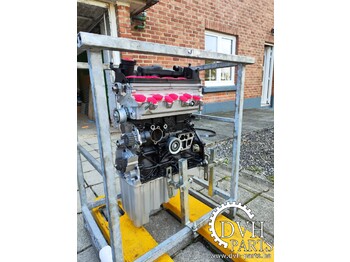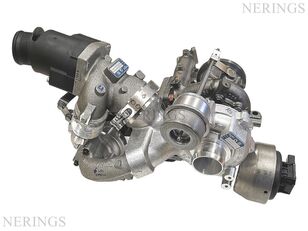Discover High-Performance Amarok Engine for Sale-- Suitable Upgrades for Your Truck
Discover High-Performance Amarok Engine for Sale-- Suitable Upgrades for Your Truck
Blog Article
Browsing the Refine of Engine Selection: Trick Elements to Take Into Consideration
The process of engine option is a diverse endeavor that demands careful evaluation of several crucial aspects to guarantee alignment with operational objectives. Efficiency demands, gas efficiency, and budgetary restraints are simply the start; factors to consider around environmental impact and maintenance assistance play a critical function in the decision-making structure.
Efficiency Needs
When picking an engine, it is crucial to develop clear efficiency needs that line up with the designated application. Efficiency requirements encompass a series of aspects, consisting of power outcome, torque qualities, and responsiveness, which need to be tailored to the specific demands of the lorry or equipment concerned.
Power output, generally determined in horsepower, establishes the engine's ability to drive a lorry or perform a job efficiently. Torque, on the other hand, is essential for applications needing strong initial acceleration or hefty training capabilities. An understanding of the functional atmosphere is likewise essential; for instance, engines designed for off-road applications may require various performance characteristics compared to those intended for freeway use.
Moreover, think about the operational tons and task cycle, as these factors affect the engine's durability and reliability. In high-load scenarios, a durable engine layout might be necessary to stop premature wear or failure. Additionally, efficiency requirements need to additionally include factors to consider for exhaust requirements and regulatory compliance, particularly in regions with stringent environmental regulations. By defining these efficiency specifications early in the selection procedure, stakeholders can make informed decisions that boost total functional performance and performance.
Gas Effectiveness Considerations
While performance requirements are vital, gas performance is similarly important in the engine option procedure, as it directly influences operating expense and ecological sustainability. Fuel-efficient engines eat much less fuel per system of work done, which not just reduces overall expenditure but also decreases greenhouse gas exhausts. As organizations progressively prioritize sustainability, picking an engine that enhances fuel effectiveness can enhance business obligation and compliance with environmental regulations.
When examining gas efficiency, it is necessary to think about the engine's layout and technology - amarok engine for sale. Advancements such as turbocharging, straight gas injection, and hybrid systems can dramatically improve fuel economic situation. Furthermore, comprehending the operating conditions and obligation cycles of the engine application is essential; engines may do in a different way under varying tons and rates
Moreover, suppliers typically supply gas intake data that can be utilized to compare different engine choices. It is suggested to assess these specifications in real-world scenarios to guarantee accuracy. Finally, the kind of fuel used can likewise influence fuel efficiency; alternative fuels might use far better efficiency and reduced discharges. In recap, gas effectiveness is a multi-faceted consideration that needs complete analysis throughout the engine option process.
Spending Plan and Cost Analysis
Spending plan and expense analysis works as an essential element in the engine choice procedure, affecting both short-term investments and lasting functional expenses. When assessing potential engines, it is important to think about not just the preliminary acquisition cost however likewise the overall cost of possession, which encompasses setup, maintenance, fuel consumption, and prospective downtime.
A complete analysis ought to start with the in advance prices connected with the engine, consisting of essential adjustments or secondary tools. Concentrating entirely on initial expenses may lead to misguided decisions. Examining operating expenses over the engine's life-span is just as vital, as more costly engines could offer exceptional fuel efficiency or reduced maintenance demands, ultimately bring about cost savings.

Environmental Impact Aspects
Recognizing ecological influence aspects is important in the engine choice process, as sustainability considerations have become increasingly important for both regulatory compliance and business obligation. Organizations should assess the emissions produced by numerous engine types, consisting of co2, nitrogen oxides, particle issue, and unburned hydrocarbons. These exhausts add significantly to air pollution and environment adjustment, requiring a careful evaluation of the engine's eco-friendly impact.
Additionally, fuel type plays an essential role in environmental impact. Engines powered by renewable resource sources, such as biofuels or hydrogen, often tend to have a reduced Visit Website environmental impact contrasted to conventional nonrenewable fuel sources. In addition, the lifecycle evaluation of the engine, from production via procedure to disposal, ought to be considered to recognize the complete range of its environmental effects.

Upkeep and Support Alternatives
When choosing an engine, the schedule of maintenance and assistance options is an essential factor to consider that can substantially impact functional performance and durability. Comprehensive upkeep intends make sure that the engine runs at peak performance and lessens unexpected downtimes. It is necessary to examine the supplier's support network, consisting of the schedule of qualified service technicians and service centers.
Evaluating the access of spare parts is additionally essential. A trusted supply chain for elements can minimize preparations for repairs and upkeep, therefore enhancing general productivity. Furthermore, take into why not find out more consideration the ease of obtaining technical paperwork and training sources, which are vital for making sure that employees are fully equipped to handle regular and emergency situation situations.
An additional crucial aspect is the guarantee and service agreements provided by the producer. Eventually, a proactive method to maintenance and assistance not just prolongs the life of the engine however likewise contributes to the total success of the procedure.
Final Thought
Finally, the process of engine option necessitates a comprehensive examination of various vital aspects, including efficiency demands, fuel performance, spending plan restraints, ecological impact, and maintenance assistance. By thoroughly evaluating these components, informed decisions can be made that straighten with operational purposes and sustainability goals. Ultimately, a critical technique to engine choice will certainly make sure optimal efficiency and longevity while resolving environmental and economic considerations properly.
While performance needs are vital, fuel effectiveness is just as essential in the engine option process, as it straight affects operating prices and environmental sustainability. As organizations significantly prioritize sustainability, choosing an engine that enhances gas efficiency can enhance company responsibility and compliance with ecological regulations.
Furthermore, recognizing the operating conditions and obligation cycles of the engine application is important; engines might execute in a different way under differing loads and rates. (amarok engine for sale)
Reviewing operating costs over the engine's life expectancy is similarly essential, as extra costly engines may supply superior fuel efficiency or decreased upkeep requirements, inevitably leading to set you back financial savings.
In next page conclusion, the process of engine selection necessitates an extensive analysis of various crucial elements, including performance demands, fuel performance, budget restrictions, ecological impact, and maintenance assistance. - amarok engine for sale
Report this page